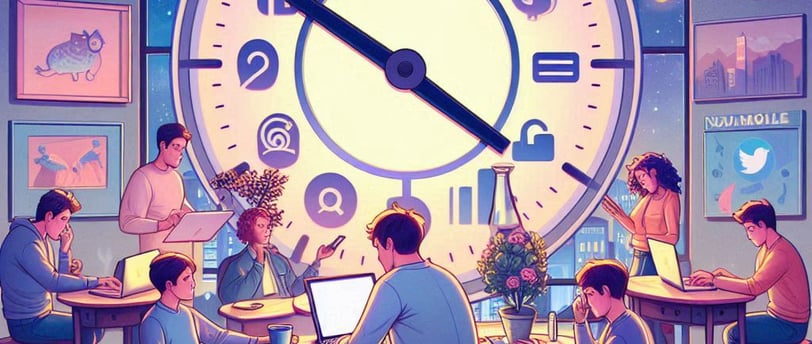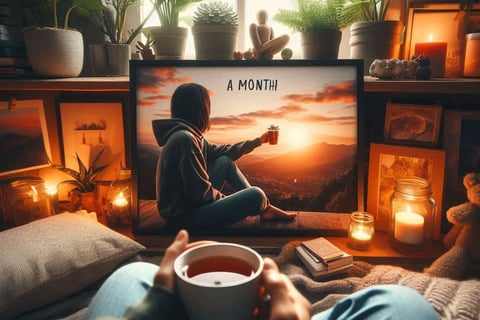No Social Media for a Month: How It Transformed My Life
Quitting social media for a month was a life-changing decision. It taught me the value of presence, focus, and meaningful connections. If you're feeling overwhelmed by social media's grip, I highly recommend trying this challenge — you might be surprised by how much better you feel.
SELF-HELP
kanav pareek
3/20/20254 min read


In today’s hyper-connected world, social media is a powerful tool that has reshaped how we communicate, learn, and stay entertained. However, it’s also become a source of distraction, anxiety, and mental exhaustion. After realizing how much time I was spending on social media — and how little value it was adding to my life — I challenged myself to quit social media for 30 days.
This decision wasn't easy, but the outcome was remarkable. In this article, I’ll share my journey, the surprising results, and how this experiment reshaped my mental clarity, relationships, and overall well-being.
The Impact of Social Media on Mental Health
Social media platforms are designed to capture attention. Features like infinite scrolling, notifications, and algorithm-driven content aim to keep users engaged for hours. While this enhances user engagement, it also has significant effects on mental health.
Psychological Effects of Social Media
Excessive social media use can lead to:
Anxiety and Depression: Research shows that constant exposure to curated highlights of others' lives can trigger feelings of inadequacy.
Sleep Disturbances: Late-night scrolling disrupts sleep patterns, affecting cognitive function and mood.
Poor Self-Esteem: Social comparison can lower self-worth and increase insecurity.
Addiction-Like Behavior: The dopamine rush from likes, comments, and shares creates dependency.
Scientific Evidence
A study published in The Journal of Social and Clinical Psychology found that limiting social media use to 30 minutes per day led to a significant reduction in anxiety, loneliness, and depression.
Why I Chose to Quit Social Media
I knew my social media habits were out of control when I caught myself spending over three hours a day mindlessly scrolling. I felt mentally drained, constantly anxious, and increasingly unproductive.
Identifying Triggers
I frequently checked social media during work breaks, which interrupted my workflow.
Notifications constantly demanded my attention, breaking my focus.
Social comparison often left me feeling unaccomplished and insecure.
Recognizing these triggers made it clear that stepping away from social media was the right decision.
The First Week: Detox and Struggles
The first few days were surprisingly difficult. My mind constantly drifted toward social media, and I often felt the impulse to check my phone.
Withdrawal Symptoms
I experienced FOMO (Fear of Missing Out), worried that I was missing important updates.
Moments of boredom felt overwhelming.
I struggled to fill idle time, feeling restless without my usual social media fix.
To combat this, I replaced scrolling with productive activities like journaling, reading, and meditation.
The Second Week: Finding New Hobbies
As the initial cravings faded, I began exploring new activities that I had long neglected.
Creative Outlets
I started painting again, which became a therapeutic outlet for self-expression.
Cooking new recipes became a relaxing and rewarding hobby.
I picked up meditation, which improved my ability to stay present and calm.
Engaging in these hobbies not only reduced my social media cravings but also brought me joy and fulfillment.
The Third Week: Mental Clarity and Productivity
By week three, I noticed a remarkable shift in my mental clarity. Tasks that once felt overwhelming became manageable, and my ability to concentrate improved significantly.
Improved Focus
My work productivity increased as I was no longer distracted by notifications.
I completed tasks faster, with greater efficiency and fewer mistakes.
I also found myself more mindful, spending quality time with loved ones without constantly checking my phone.
The Fourth Week: Emotional Growth and Connections
During the final week, I felt emotionally stronger and more connected to the people around me. Without social media acting as a buffer, I engaged in deeper conversations and felt more present in my relationships.
Emotional Improvements
My communication skills improved.
I felt more empathetic, as I truly listened to others without digital distractions.
I became more self-aware, understanding my emotions better.
How My Life Changed After a Month
The 30-day detox completely reshaped my lifestyle. I developed a healthier balance with my phone, limiting social media to just 15-20 minutes a day. My anxiety levels decreased, I became more productive, and my relationships improved.


Research and Scientific Evidence
Research published in The Journal of Experimental Psychology confirms that individuals who take social media breaks experience lower stress levels and higher productivity. A separate study in Cyberpsychology, Behavior, and Social Networking highlights that reduced screen time enhances sleep quality and emotional well-being.
The Generosity Factor: Giving More of Myself
With newfound time and energy, I naturally gravitated toward helping others. I started volunteering at a local shelter, joined community events, and reconnected with old friends.
This generosity enriched my life with purpose, deepening my sense of fulfillment and contentment.
How You Can Start Your Own Social Media Detox
To start your own detox:
Set realistic goals (start with a weekend or week).
Inform friends and family to avoid misunderstandings.
Replace social media with hobbies, reading, or outdoor activities.
Track your progress with a journal to stay motivated.
Conclusion and Final Thoughts
Quitting social media for a month was a life-changing decision. It taught me the value of presence, focus, and meaningful connections. If you're feeling overwhelmed by social media's grip, I highly recommend trying this challenge — you might be surprised by how much better you feel.
FAQs
1. How long should I try a social media detox to see results?
The ideal detox duration varies from person to person. For noticeable results, a 30-day detox is highly effective. However, starting with a 7-day or 14-day detox can also bring positive changes in focus, mood, and productivity.
2. Will I lose touch with friends and family during a detox?
Not necessarily. Before starting your detox, inform your close circle about your decision. Encourage them to connect with you through calls, texts, or in-person meetings. Most meaningful relationships strengthen when you engage more directly.
3. What if I rely on social media for work or networking?
If social media is essential for your career, consider setting boundaries. Limit your usage strictly to professional tasks and avoid mindless scrolling. Tools like website blockers or productivity apps can help you manage time better.
4. How do I manage the fear of missing out (FOMO)?
FOMO is common during a social media detox. Remind yourself that important news or updates will still reach you through other channels. Focus on the benefits of being present and productive instead.
5. What can I do to replace social media habits?
Fill the void by engaging in meaningful activities such as:
Reading books or listening to podcasts
Pursuing creative hobbies like drawing, writing, or photography
Exercising or joining a fitness class
Spending quality time with friends and family
Practicing mindfulness and meditation
By replacing social media with fulfilling activities, you'll find it easier to stay committed to your detox goals.
Blog
Content
Engage
contact@growthtimewithme.com
© 2024. All rights reserved.
